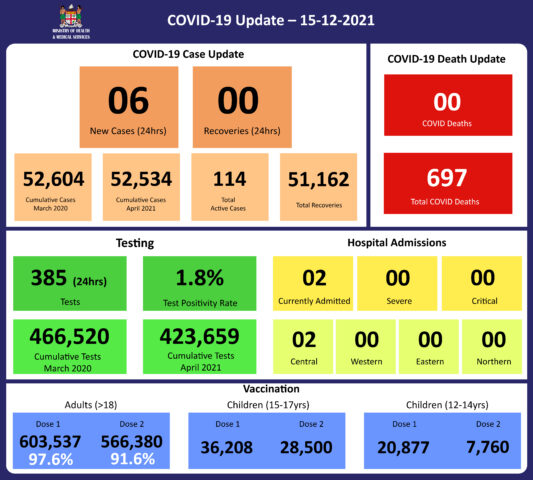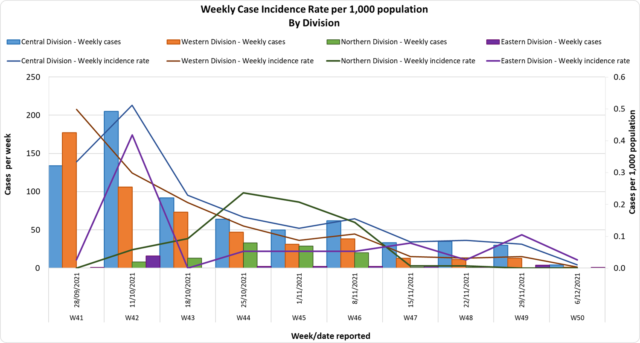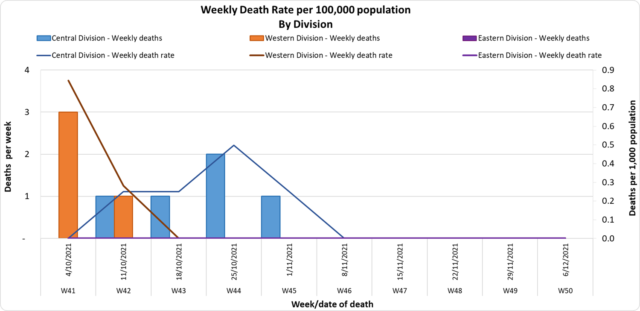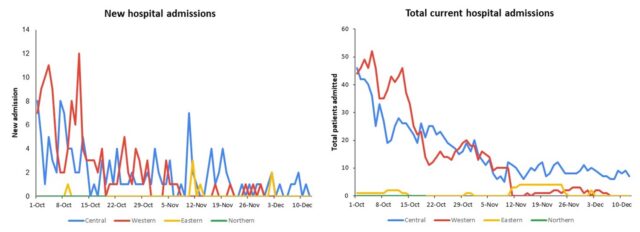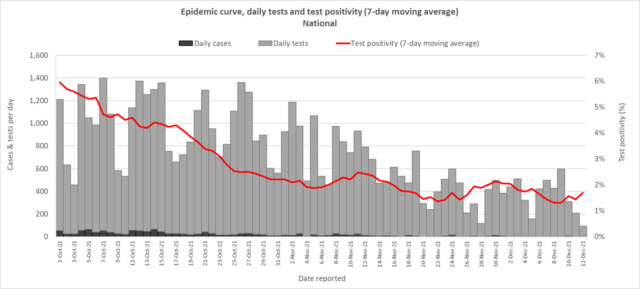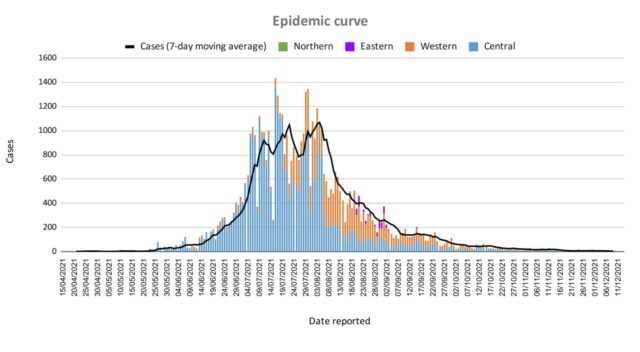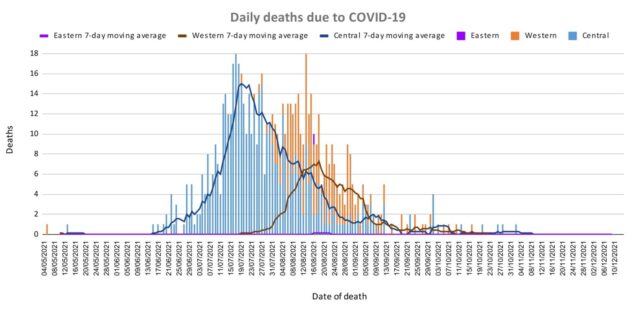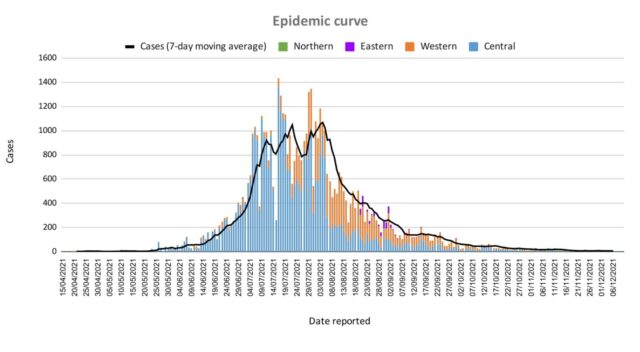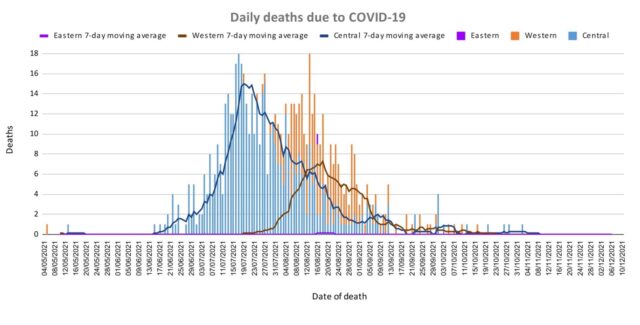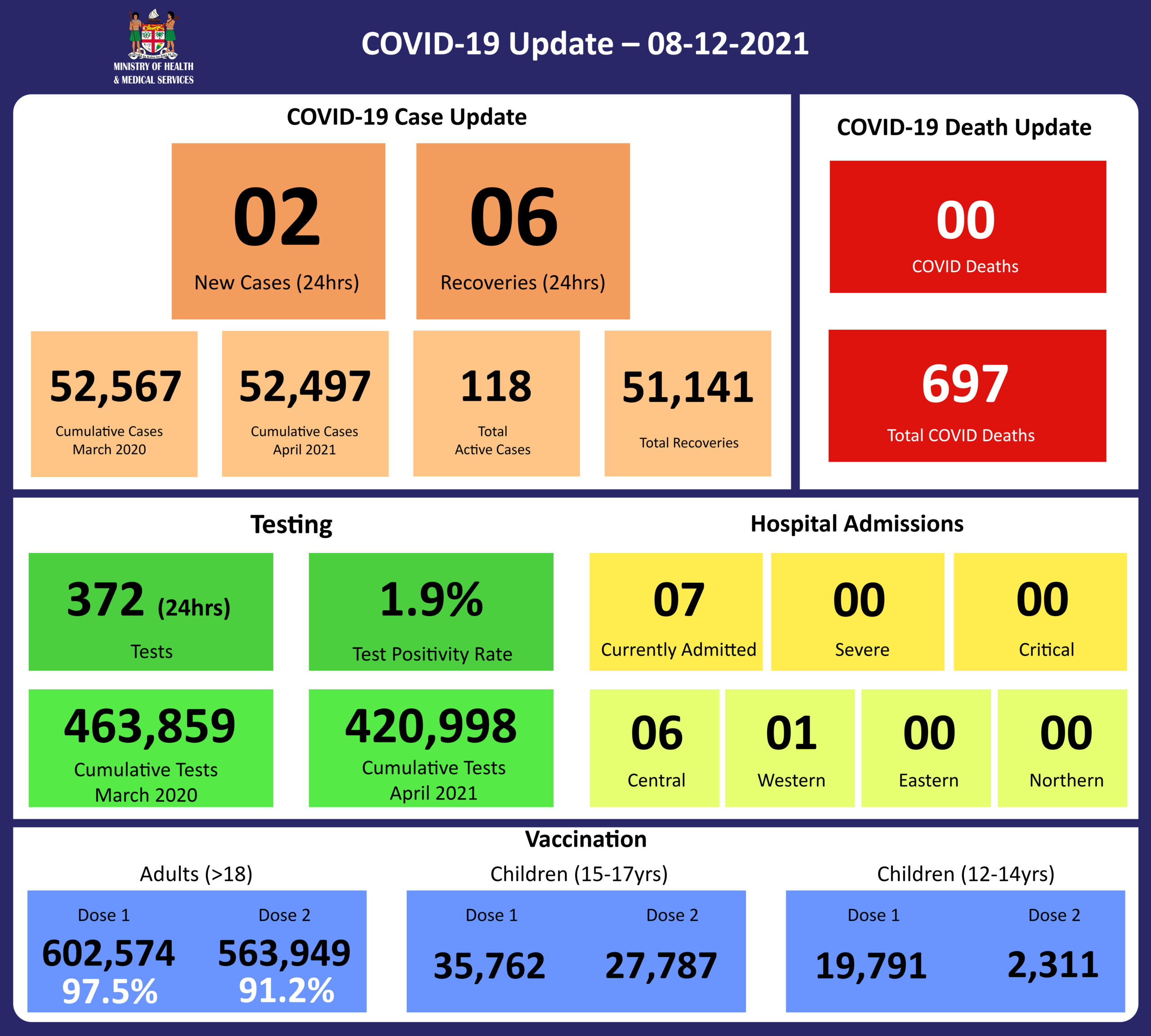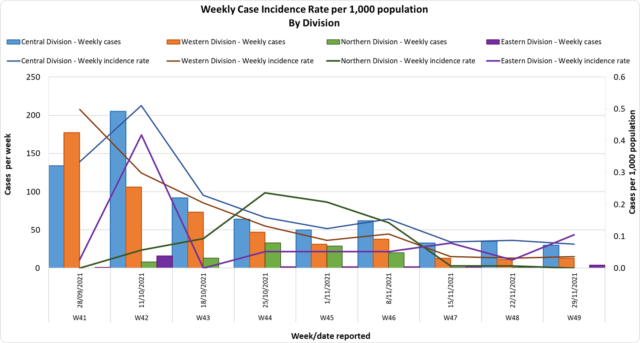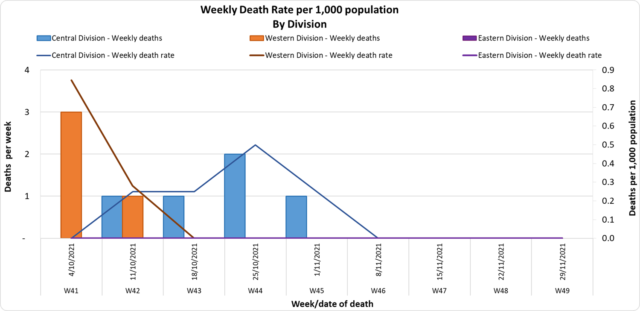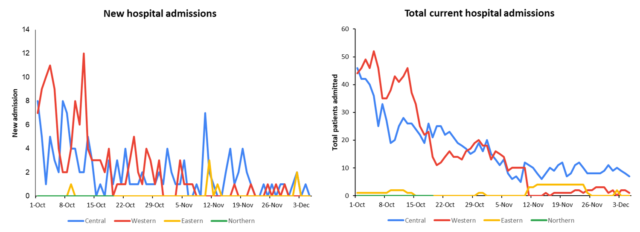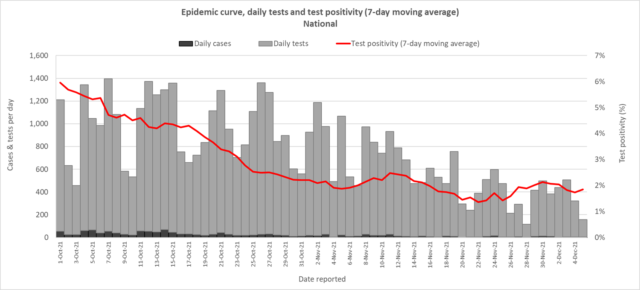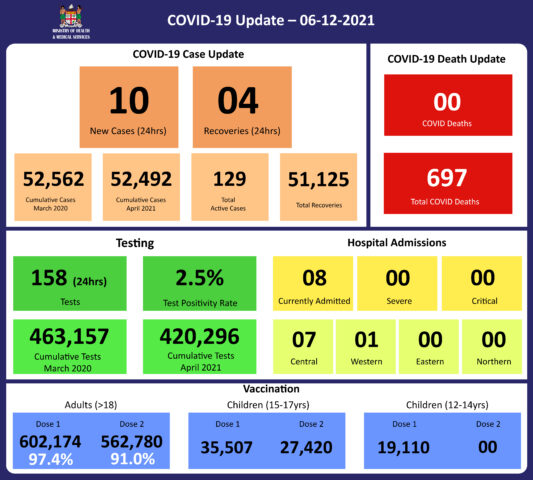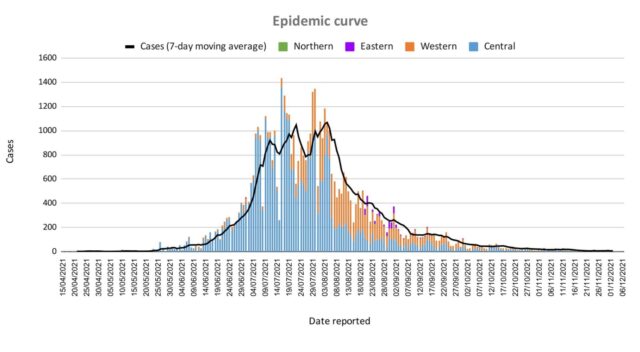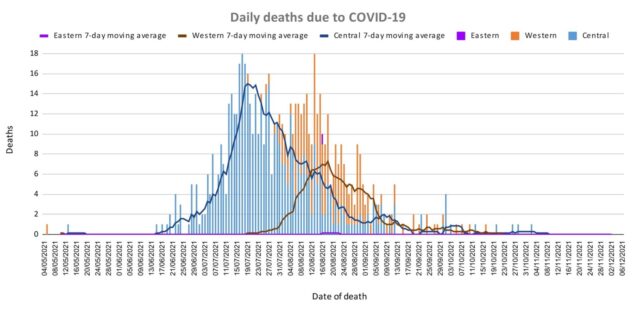COVID-19 Situation Update
Wednesday, 15th December
| Transmission Update:
In the past 7 days, 15 cases were recorded in the Central division, 12 new cases in the Western division, 2 new cases in the Eastern Division, and nil new cases in the Northern Division. The Central Division cases constitute 71% of the cumulative total cases nationally, with the Western division making up 28% and 1% in the Northern and Eastern Divisions. Since the last update, we have recorded 11 new cases of which 5 new cases were recorded on 14/12/2021 and 6 new cases in the last 24 hours ending at 8 am this morning. The national 7-day rolling average of cases as of 11th December is 5 daily cases. The weekly incidence rate graph by division indicates a continually declining trend. Furthermore, the peak weekly incidence in the western division was approximately a third of that in the central division, and the cumulative case numbers are also reflecting a similar difference. |
| Deaths:
This curve depicts the weekly death rate per 1000 population by divisions since October 2021. Overall, the death rate graphs for the Central and Western Divisions indicate a declining trend. The differences between the Central and Western are similar to the incidence of the weekly cases and are likely a reflection of vaccination levels, COVID mitigation measures, and differences in population density. There is no COVID-19 death to report. There have been 697 deaths due to COVID-19 in Fiji, with 695 of these deaths during the outbreak that started in April this year. Please note that due to the time required by clinical teams to investigate, classify and report deaths, a 4-day interval is given to calculate the 7 days rolling average of deaths, based on the date of death, to help ensure the data collected is complete before the average is reported. Therefore, as of December 11th, the national 7 days rolling average for COVID-19 deaths per day is 0.0, with a case fatality rate of 1.32%. We have recorded 611 COVID-19 positive patients who died from serious medical conditions they had before they contracted COVID-19; these are not classified as COVID-19 deaths. |
| Hospitalisation:
The downward trend in both the new hospital admissions and total admissions in all hospitals admitting COVID-19 patients across the country is consistent with the cases and death trends. The hospital admissions continue on a downward trend indicating a sustained positive response to COVID mitigation measures, Population density differences, and differential Vaccination rates. |
| Testing:
385 tests have been reported for December 14th, 2021. The 7-day daily test average is 345 tests per day or 0.4 tests per 1,000 population. The national 7-day average daily test positivity is 1.8%, which is within the WHO recommendation of 5%, and this is illustrated by the lab testing graph. Though we continue testing in high-risk areas, our case numbers and test positivity rate indicate a better control of the community transmission in Fiji through the combined efforts of containment and mitigation measures with ongoing community surveillance. |
Epidemic Outlook:
The Ministry of Health continues to monitor the outbreak using indicators such as daily case numbers, hospitalizations, test positivity, and deaths.
Occupancy rates in health facilities, the occupancy rate of ICU beds, death rates, and vaccination coverage are indicators to monitor our health response capacity and we see a decreasing trend across indicators from our health facilities with increasing vaccination coverage for adults and 15-17-year-olds in Fiji. With the commencement of vaccination for 12-14-year-olds, we expect their coverage to contribute to reducing the risk of severe disease, hospitalization, and death.
With international travel open, we anticipate our testing numbers to increase from international repatriates and travelers including Fijians visiting families and friends. With increasing COVID-19 cases in the European region and the emergence of the new variant Omicron, we anticipate continued surveillance and testing at our borders, communities, and maritime islands to monitor and detect cases for early intervention.
Public Advisory:
In a widely publicized statement today the WHO Director-General Tedros Adhanom has clearly stated sentiments that the Ministry of Health and Medical Services has been promoting for a long time
“Seventy-seven countries have now reported cases of Omicron, and the reality is that Omicron is probably in most countries, even if it hasn’t been detected yet. Omicron is spreading at a rate we have not seen with any previous variant”
“We’re concerned that people are dismissing Omicron as mild. Surely, we have learned by now that we underestimate this virus at our peril. Even if Omicron does cause less severe disease, the sheer number of cases could once again overwhelm unprepared health systems”
“I need to be very clear: vaccines alone will not get any country out of this crisis. Countries can – and must – prevent the spread of Omicron with measures that work today. It’s not vaccines instead of masks. It’s not vaccines instead of distancing. It’s not vaccines instead ventilation or hand hygiene. Do it all. Do it consistently. Do it well”
He also highlighted evolving evidence that suggests a small decline in the effectiveness of vaccines against severe COVID19 disease and death, and a decline in preventing mild disease or infection.
The message from MOHMS today is, therefore, the same:
- If a variant is transmissible enough, stringent border and community measures will only delay the inevitable entry and spread of current and future variants of the COVID-19 virus, especially as the Omicron variant is also spreading into some of our travel partner countries. To protect ourselves, our loved ones, and our country, we must all get vaccinated when it is our turn. And even with our high vaccination levels, we must maintain COVID safe habits: mask wisely by carrying a well-fitted mask when you leave your home and wear the mask properly in public indoor spaces, public service vehicles, and outdoor crowded spaces; open windows to improve ventilation; avoid poorly ventilated or crowded spaces; 2-meter physical distancing and ensure you are wearing a mask if you cannot maintain distance; cough or sneeze into a bent elbow or tissue, wash your hands frequently with soap and water or an alcohol-based hand sanitizer.
- The discovery of OMICRON is a sharp reminder to ourselves that the key to avoiding future restrictions and lockdowns is for us all to remain cautious about how we engage in the greater freedom we will enjoy. Whilst the easing of restrictions is needed to facilitate livelihoods, we must ensure that together with vaccination, we continue to observe our COVID safe measures and avoid contained spaces and crowds.
As Permanent Secretary for Health and Medical Services, I remain extremely concerned at the lack of adherence to COVID safe measures in gatherings throughout the country, especially the adherence to masking in indoor public spaces. After the Delta outbreak this year, it is understandable that many will feel the urge to relax and celebrate now that case numbers are low, especially during the festive season. And many of us have let our guards slip. We are all human. But this must stop as vaccination AND COVID Safe measures are the only way to safely navigate our way through the pandemic while facilitating socioeconomic recovery and well-being.

